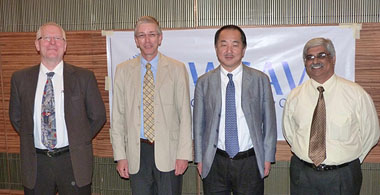WSAVA Vaccination Guidelines Group Continues Asian Project With Visit To India
 13 years ago
13 years ago  2100 views
2100 views
Posted
15th October, 2012 11h36
 (Left to right) Members of the VGG meet in Mumbai, India: Professor Richard Squires (James Cook University, Australia), Professor Michael J Day (University of Bristol, UK; Chairman), Professor Hajime Tsujimoto (University of Tokyo, Japan) and Dr Umesh Karkare (Private Practitioner, Mumbai and WSAVA Representative for India). Dr Karkare was co-opted onto the VGG for this visit.
The Vaccination Guidelines Group (VGG) of the World Small Animal Veterinary Association (WSAVA), chaired by Professor Michael Day of the University of Bristol, has continued its two year project to advise veterinarians on the Asian continent on optimal vaccination practice with a visit to India.
(Left to right) Members of the VGG meet in Mumbai, India: Professor Richard Squires (James Cook University, Australia), Professor Michael J Day (University of Bristol, UK; Chairman), Professor Hajime Tsujimoto (University of Tokyo, Japan) and Dr Umesh Karkare (Private Practitioner, Mumbai and WSAVA Representative for India). Dr Karkare was co-opted onto the VGG for this visit.
The Vaccination Guidelines Group (VGG) of the World Small Animal Veterinary Association (WSAVA), chaired by Professor Michael Day of the University of Bristol, has continued its two year project to advise veterinarians on the Asian continent on optimal vaccination practice with a visit to India.
 An umbrella organisation focused on enhancing the clinical care of companion animals, the WSAVA represents 180,000 veterinarians globally through 92 member associations. Its VGG develops globally relevant recommendations for best practice in the vaccination of dogs and cats. It has published a set of Vaccination Guidelines, with accompanying fact sheets and FAQs as a practical tool to support veterinarians in practice around the world.
During its visit to India, the VGG team met veterinary practitioners, vaccine manufacturers and government representatives in Delhi and Mumbai. The team made site visits to six veterinary practices including a municipal dispensary. A key focus on the subcontinent is the control of canine rabies virus which members discussed with Major General Kharb, Chairman of the Animal Welfare Board of India and Dr Nalinika Obeyesekere, a practitioner from Colombo and founder of the Blue Paw Trust. The Blue Paw Trust is a charity working to eliminate canine rabies from Sri Lanka.
The VGG team collected data from over 140 veterinarians by survey questionnaire and presented vaccinology CE programmes in Delhi and Mumbai which were attended by 180 veterinarians.
Professor Michael Day commented: “Through our meetings and site visits, we built up a good understanding of the particular problems faced by the Indian subcontinent – in particular the challenge of controlling canine rabies virus infection. As there are an estimated 20,000 human deaths annually from canine rabies virus infection in India, it was encouraging to learn of a new government control programme starting later this year. We look forward to continuing to support the Indian veterinary community in its quest to control this dreadful disease.”
The VGG will meet next in China and Thailand in July 2013 to continue collecting information to enable the formulation of key recommendations for optimum vaccination practice in Asia.
An umbrella organisation focused on enhancing the clinical care of companion animals, the WSAVA represents 180,000 veterinarians globally through 92 member associations. Its VGG develops globally relevant recommendations for best practice in the vaccination of dogs and cats. It has published a set of Vaccination Guidelines, with accompanying fact sheets and FAQs as a practical tool to support veterinarians in practice around the world.
During its visit to India, the VGG team met veterinary practitioners, vaccine manufacturers and government representatives in Delhi and Mumbai. The team made site visits to six veterinary practices including a municipal dispensary. A key focus on the subcontinent is the control of canine rabies virus which members discussed with Major General Kharb, Chairman of the Animal Welfare Board of India and Dr Nalinika Obeyesekere, a practitioner from Colombo and founder of the Blue Paw Trust. The Blue Paw Trust is a charity working to eliminate canine rabies from Sri Lanka.
The VGG team collected data from over 140 veterinarians by survey questionnaire and presented vaccinology CE programmes in Delhi and Mumbai which were attended by 180 veterinarians.
Professor Michael Day commented: “Through our meetings and site visits, we built up a good understanding of the particular problems faced by the Indian subcontinent – in particular the challenge of controlling canine rabies virus infection. As there are an estimated 20,000 human deaths annually from canine rabies virus infection in India, it was encouraging to learn of a new government control programme starting later this year. We look forward to continuing to support the Indian veterinary community in its quest to control this dreadful disease.”
The VGG will meet next in China and Thailand in July 2013 to continue collecting information to enable the formulation of key recommendations for optimum vaccination practice in Asia.More from
- Animus launches SkinBond Multi for enhanced wound care
- IVC Evidensia reports 82% cut in Farm antibiotic use and 20% carbon emissions reduction
- Vet professionals flock to sign up to transformative locum platform
- The ProSalus Foundation launches urgent appeal for UK vets to support Ukrainian colleagues
- Vetsure Named Business of the Year at 2025 SME National Business Awards

